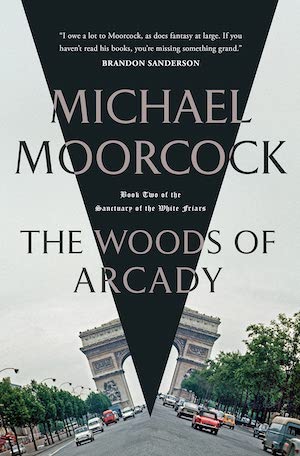Once upon a time, Michael Moorcock “could write a trilogy in a couple of weeks and still have time off for picnics.” Completing three books in three weeks is a feat that few writers could manage or would attempt, but what staggers the imagination is that they ranged from good to fantastic. Many of his 1960s and 1970s works remain in print today, and I expect them to be read as long as fantasy has readers. These days, Moorcock has slowed down a bit: Eight years have passed since he published The Whispering Swarm, the first volume of an autobiographical fantasy trilogy, The Sanctuary of the White Friars, which sees Michael Moorcock building a career, establishing and then disestablishing a family, and writing dozens of books while also going on swashbuckling adventures with highwaymen and musketeers drawn from other worlds.
It’s common practice, when reviewing the middle book of a trilogy, to announce that readers will be lost if they’re not familiar with the first volume. For better or for worse, The Woods of Arcady doesn’t merit this warning: It’s equally confusing and overwhelming whether or not you’ve read the first volume. Indeed, it may well be that the “Michael Moorcock” of this volume comes from a different corner of the multiverse than the one in the previous novel. In that book, many real-life figures were lightly disguised. Some masks are dropped here; for example, the man called “Allard” in The Whispering Swarm is here identified as J.G. Ballard.
Buy the Book


The Woods of Arcady
Moorcock, whose first stories appeared when he was a teenager, has been a professional writer for almost seven decades. With The Sanctuary of the White Friars, he wants to summarize and cap his career with a series that’s equal parts reflexive, reflective, and rambling, simultaneously self-mythologizing and self-deprecating. It’s a book that his longest-standing fans will appreciate, but it seems to have been written without too much thought for the audience. As Moorcock, the narrator, reminds us:
I have written hundreds of linear plots and learned early on in the word factories of Fleet Street how to prefigure, to whet the reader’s curiosity, to have a carrot-and- stick approach which drives and guides the reader forward
Moorcock, the real-world writer, wants to try something new and different that places demands on both author and audience. While these books will confuse and frustrate most anyone, they are exactly what Moorcock wanted to write.
Three main stories intertwine and eventually intersect; Moorcock shifts his perspectives from paragraph to paragraph, even sentence to sentence, and almost always without a section break of white space. The novel begins sometime in the 1930s, with a man named Harold Blackstone reflecting on time, memory, and the English landscape as a train wends its way through the British countryside. After a few pages of this, we get a single paragraph set in the “Second Ether” of Moorcock’s 1990s War Amongst the Angels trilogy. Then Moorcock touches back down to the realish world, with a rambling account of the life and times of Michael Moorcock, which begins in a realistic vein and slowly grows fantastical.
The Blackstone segments of the narrative are the most sedate and traditionally novelistic, while the Second Ether segments are packed full of allusion, wordplay, and abstruse references to art and music. The Second Ether, in Moorcock’s complex mythology, is “the origin of all Chaos.” As such, every conversation abounds in non sequiturs and Dadaist coinages. A little of it goes a long way:
Milton Missy slipped his astonishing hands about the gaffawheel and looked up from his natterlense, his trellised eyes red with rimless secretions and half an inch of Gatsby gardenias ripping the rivets from his rear plate. “Okay, Jean-Paul bloody Sarrrrtre! How is there a future when all we do is cheese fall? Upstart space-lawyers growling along once-friendly skies and policing the swirling pathways down into where all colours become one? What’s this idea of Fate all of a sudden? I’ll no doubt have this and form lasting memories or we’re prosecuting upscale for always and all time to become nowt but fine powder to blow us all and spuff it sideways to what? No, no, you screeps and scallox swaggering supplements of scummers beyond Spammer, you name it, girls!”
Readers of the Angels trilogy or the very good Moorcock’s Multiverse comic from 1997 can interpret maybe thirty percent of this, but we’re not supposed to know what a natterlense is or what a Gatsby gardenia smells like. As Lewis Carroll knew, there’s no need to describe a frumious Bandersnatch — the nonsense is the point.
If you don’t care about Mr. Blackstone and the Second Ether gives you the vapors, there’s still the bulk of the novel to consider: Michael Moorcock’s fictionalized and fantasticized life story.
Much of The Woods of Arcady reads like a lightly edited transcript of Moorcock telling the story of his life and his craft over a pint. Digression piles upon digression; if you’re interested in Swinging London, mid-century experimental writers, or Moorcock’s tenure at New Worlds magazine, you’ll find much to enjoy, though the author occasionally ventures into score-settling, cryptic aphorism, and self-congratulation:
At New Worlds we were part of a movement which, threatened by information overkill, found techniques for including multiple themes in linear and non-linear fiction, telling stories which were as complex, yet as intuitive, as the mass of out- side information being filtered by our machines, our senses, our minds – our imagination. A lexicon for the multiverse. Increasing our sense of what evil was. Fashion ruled over taste. Complexity was resisted or simplified by art. But, where we were aiming to be laconic and concise, others pumped up derivative work in clumsy imitation or dusty homage, so that we were soon distancing ourselves from any ‘movement’, from New Wave to Cyberpunk.
“Laconic and concise” The Woods of Arcady is not: It’s about a hundred pages into this five-hundred page novel before something resembling a plot appears, and many prospective readers will have abandoned it long before the traditional action starts. Moorcock knows this. As a parenthetical in the first chapter puts it: “Don’t worry, dear, we’ll soon be bringing in the airships and the magic swords.”
When I put down The Woods of Arcady, I found myself thinking back to Jeff VanderMeer’s introduction to The Best of Michael Moorcock: “Michael Moorcock has written for so long in so many different genres that there’s something for every reader to hate.” The Woods of Arcady is a messy book, to my mind overlong and underedited. Most readers will hate it, and it’s hard to blame them. Those of us who’ve spent long years exploring the many strange corners of Moorcock’s worlds may agree that these Woods are overgrown, but there are treasures in their depths.
The Woods of Arcady is published by Tor Books.
Matt Keeley reads too much and watches too many movies. You can find him on Twitter at @mattkeeley.










